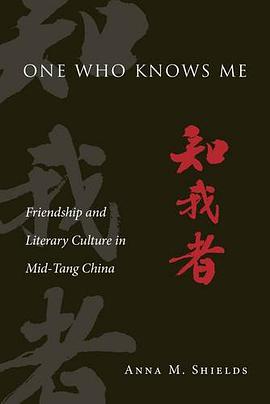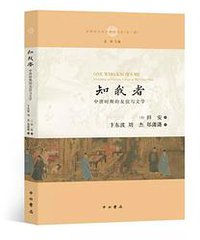One Who Knows Me
豆瓣
Friendship and Literary Culture in Mid-Tang China
Anna M. Shields
简介
http://www.hup.harvard.edu/catalog.php?isbn=9780674504370
The friendships of writers of the mid-Tang era (780s–820s)—between literary giants like Bai Juyi and Yuan Zhen, Han Yu and Meng Jiao, Liu Zongyuan and Liu Yuxi—became famous through the many texts they wrote to and about one another. What inspired mid-Tang literati to write about their friendships with such zeal? And how did these writings influence Tang literary culture more broadly? In One Who Knows Me, the first book to delve into friendship in medieval China, Anna M. Shields explores the literature of the mid-Tang to reveal the complex value its writers discovered in friendship—as a rewarding social practice, a rich literary topic, a way to negotiate literati identity, and a path toward self-understanding. Shields traces the evolution of the performance of friendship through a wide range of genres, including letters, prefaces, exchange poetry, and funerary texts, and interweaves elegant translations with close readings of these texts. For mid-Tang literati, writing about friendship became a powerful way to write about oneself and to reflect upon a shared culture. Their texts reveal the ways that friendship intersected the public and private realms of experience and, in the process, reshaped both.
contents
Acknowledgments
Introduction: Figuring Friendship
1. Contexts for Friendship in Mid-Tang Literary Culture
The Discourse of Friendship
Historical Patterns
Social and Cultural Contexts
2. Building Networks: Friendship, Patronage, and Celebrity
Seeking a Patron: Writing for the zhiji
Selling Meng Jiao: Friendship and Patronage
Becoming Bai Juyi: Friendship and Celebrity
3. Responding in Kind: Friendship and Poetic Exchange
Mid-Tang Perspectives on Poetic Exhange and Friendship
Collaboration and Competition: The Linked Verses of Han Yu and Meng Jiao
Contesting the Past: The Nostalgic Exchanges of Bai Juyi and Yuan Zhen
4. To Know and Be Known: The Epistemology of Friendship
Epistemological Dimensions of Letters to Friends
Understanding: Using the Knowledge of Friendship
Misunderstanding: Negotiating Criticism and Conflict
Coda: In the Absence of Knowledge
5. For the Dead and the Living: Performing Friendship after Death
Funerary Inscriptions for Friends
Offering Texts and the Performance of Friendship
Writing the Life and Death of Han Yu
Conclusion
Selected Bibliography
Index
